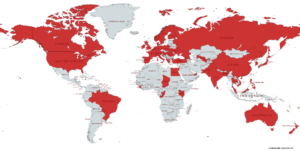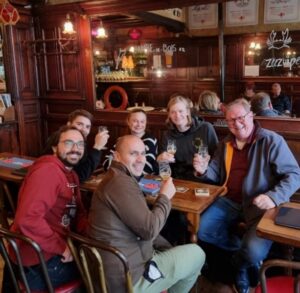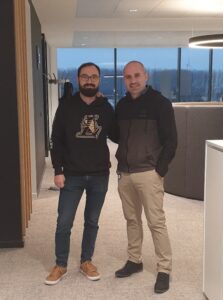
Moving abroad for work is an ambitious undertaking and one can count on a few difficulties to manage along the way; bureaucracies to navigate, culture shocks to undergo, all the while searching for new friends, new favorite restaurants, or even learning a new language. Regardless, the number of expats living worldwide is estimated to be more than 56 million – and this number keeps rising. In a recent internal survey, our AEC team shared their experiences living abroad; we counted an impressive 50+ countries that our team has collectively lived in. To dive deeper into the subject, we asked some of our expert expats for a few tips. Daniele and Tim have relocated from Munich, Germany to Antwerp, Belgium in February 2022. Now that they have had some time to settle in, we spoke with them again to hear how their move went, how they are enjoying Belgium, and what advice they have for other professionals who may move countries for work.
How have you settled in at Antwerp?
Daniele: I have moved quite a few times to different countries, but I confess that the process was not easy due to heavy bureaucracy, but now everything is in place. For living, I selected a location in between the city and our workplace in Kallo. Logistically it is very convenient, and the place is beautiful with a lot of green areas.
You can never be too prepared – what challenge about moving did you least expect?
Tim: The least expected for me was the whole process of registration in Belgium. I’m used to the German system of course, in which you simply go to the local town hall and register yourself. But in Belgium, especially in a city like Antwerp, it’s all a bit more complicated with handing in documents, waiting for the police inspection, going for an appointment, waiting for an answer, and making another appointment to finally be registered.
Daniele: AEC provided excellent support for us to learn as much as possible about the country before moving. But once you live in a new place there is always a direct learning process going on. In general, I am happy with my decision to move. It’s another great life experience for myself and my family. Of course, there are aspects (i.e., cost of living, taxation, crazy heavy traffic) that I still need to better understand and learn how to keep under control. One subject that was unexpectedly difficult was how to deal with the garbage at home for example, due to the strict rules of sorting, recycling, and disposal.
What aspect of immigrating to a new country was easier than expected?
Daniele: Communication with public administration officers and with people in general. Practically everybody speaks good English in Belgium, so that is obviously helpful for us expats.
Tim: Getting used to the culture. In my experience, the Belgian culture feels quite similar to the English culture, which I was used to due to living a year in London. Because of that it was easier for me than expected to get used to how people act with each other.
What is your favorite thing about Antwerp? What do you like least?

Copyright: AEC 2021.
Tim: My favorite would be probably the pub and restaurant culture. Another big advantage I would say is the kindness and openness of Belgian people who don’t have a problem to answer my questions in English as I’m still struggling with Dutch and Flemish.
Daniele: Pros are the famous Belgian beer and chocolate – and the cozy restaurants. Cons: Cost of living, bureaucracy, and speed cameras everywhere!
How do you like the AEC office in Belgium?
Daniele: Amazing shape, excellent quality, nice view from our floor.
Tim: From the first day I felt welcome and as a part of a big family. It doesn’t matter if you are part of a specific department or team, everyone is open to each other, and we form a strong team together.

Are there any major cultural differences you’ve noticed between Germany and Belgium?
Daniele: In general, I find that Belgium tends to overcomplicate things, but most of the shops and supermarkets are open during the weekend which is great compared to Munich for example.
Tim: The major difference is the interaction between each other. Whereas Germans tend to be more reserved and closed, in my experience, Belgian people are more open, even to strangers.
What advice do you have for people who are considering moving for work?
Tim: Learn the language which is dominant in the city beforehand!
Daniele: Invest time in learning in advance the important aspects of the new place (cost of living, taxation, services, cultural setup, etc.). Bring with you a lot of enthusiasm and take time to explore and become familiar with the place!
Thank you, Daniele & Tim for sharing your top tips on moving countries.
Read more about our office locations in St. Catharines, Antwerp, Munich, and Turin on the AEC Blog.






